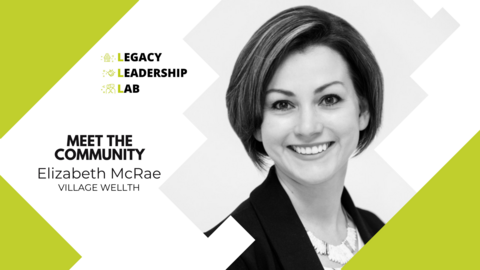
This interview is part two of a series of interviews with L3 Community members in the Activation stream. The L3 Community is a fast-evolving group of stakeholders that are involved in designing, delivering, or supporting products, services, and initiatives that will enable social acquisitions in their own communities and contexts. Members in the Community’s Activation stream aim to raise interest around Canada in building systemic support for social acquisitions and social purpose conversions. We spoke with Elizabeth McRae about her work in Commercial Ventures, Village Wellth, her experience as a L3 Activation member and how the three intersect towards the larger goal of building systems to support social acquisition.
Elizabeth McRae is the President at Commercial Ventures, a boutique consulting & transaction services firm that helps business owners prepare for exit and close transactions. Elizabeth is also the co-founder of Village Wellth, an online platform designed to assist buyers in the business search and acquisition process, welcoming new business owners to entrepreneurship through acquisition.
What aspect of social acquisition interests you the most? How do you work with that in your role as an Activator?
Social acquisition opens up the scope of options for business owners according to their needs, values and perspectives on when and how they wish to exit. Village Wellth places the client’s values as a priority on how they wish to exit, especially as they explore nontraditional exit avenues. Our work provides professional advice to business owners through a needs-assessment model regarding exit planning. I also teach exit planning with three categories (individual, strategic and financial). With L3, we have added a fourth category of a social acquirer.
Awareness of social acquisition is key to accommodate and educate clients. By providing a holistic picture of many exit avenues, clients are empowered with information and control of their own exit planning. We have done our job when clients can access resources and advisors, they need to choose the most appropriate path.
What are some insights you suggested to L3 from your experience? How did that insight turn into a knowledge product/resource for the Design stream?
Direct contact with business owners is really important to build solutions in two ways. Firstly, consultants can provide support to clients and develop programs that effectively meet their needs. Secondly, platform development is important to increase access to business buyers and donors. From my work at Village Wellth and Commercial Ventures, we have shared a lot of process mapping with L3 to refine the process of social acquisition. The process map describes the possible routes to be taken during the conversion/succession process from selling, buying, to sustaining the business.
What is something you picked up during the quarantine of 2020? How does that reflect your values or your personality?
This year I started to go more with the flow, let go of some of my hustle and be more in tune with things coming my way instead of chasing them. We have been forced to slow down. I have said this during my courses as well, that I hope everyone has been reflecting more this year than ever. If nothing else, I hope we have been able to see more authentically what we really want in our lives.
About Legacy Leadership Lab (L3)
L3 is an 18-month initiative by the Waterloo Institute for Social Innovation and Resilience, funded by the Government of Canada’s Investment Readiness program. We are leading online workshops and events to help build expert-driven solutions for Canada’s transitioning small business community. The L3 Community is developing and activating market interventions and prototypes that allow conventional and social finance players, business service providers, and community leaders to facilitate social acquisitions of existing businesses in their own towns and contexts.
AboutWaterloo Institute for Social Innovation and Resilience (WISIR)
WISIR is a research institute at the University of Waterloo’s School of Environment, Enterprise and Development committed to generating trans- and inter-disciplinary knowledge about social innovations and the social innovation process (the dynamics of learning, adaptation and resilience). Our approach is to pursue collaborative research and projects that bridge University of Waterloo departments, involve researchers from around the world, and engage those beyond academia. We seek to mobilize this knowledge through a range of new curriculum offerings and training opportunities - both within and outside of a university setting.